|
|
|
Sort Order |
|
|
|
Items / Page
|
|
|
|
|
|
|
| Srl | Item |
| 1 |
ID:
142687
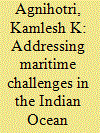

|
|
|
|
|
| Summary/Abstract |
The vastness and diversity of the Indian Ocean Region (IOR) and its littorals, and difference in the latters’ overall view of regional security, presents a broad spectrum of challenges therein. The maritime capacities of most littoral states are not strong enough to individually address these challenges. However, synergised response strategies, appropriately regulated by one or two collectively mandated apex bodies, would greatly help in managing regional maritime security. The existing maritime cooperative initiatives in IOR, like the Indian Ocean Rim Association (IORA) and Indian Ocean Naval Symposium (IONS), have shown great promise and potential. Countries like India and Australia, major players in both these constructs, can possibly rally other IOR littorals into leveraging their maritime capacities under these pan-regional fora by mutual agreement. Concurrently, both initiatives could find congruence in their maritime security visions, so as to create a collaborative local environment for collective benefits without dependence on extra-regional players.
|
|
|
|
|
|
|
|
|
|
|
|
|
|
|
|
| 2 |
ID:
083016
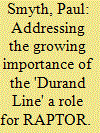

|
|
|
| 3 |
ID:
189245


|
|
|
|
|
| Summary/Abstract |
This article examines the new prominence accorded to the “Indo-Pacific” (IP) concept in the strategic narratives championed by the US and its closest allies, (Japan and Australia), and then juxtaposes this with the responses of other key regional powers. To this purpose, Part I distils a concise conceptual model encompassing three interlocking facets – mental maps, political/ideological drivers, and visions of regional order – designed to structure the following empirical analyses. Part II then accesses this model to reveal how these facets are reflected in the discursive and policy-making practices of the US and its close allies, as embodied in their (combined) regional strategies. Next, Part III considers how a cross-section of major states in the region – India, South Korea, and China - have responded to this enterprise, to determine the degree to which they have adopted, accommodated or opposed the IP concept, or otherwise propose national alternatives to the US-centered project. It concludes that the IP concept is not simply an objective geopolitical descriptor, but rather a controversial and contested discursive field, subject to multiple interpretations. Such a polarizing concept will likely contribute to further sharpening of strategic mistrust and geopolitical competition amongst the region’s major powers.
|
|
|
|
|
|
|
|
|
|
|
|
|
|
|
|
| 4 |
ID:
128127
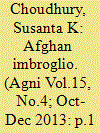

|
|
|
|
|
| Publication |
2013.
|
| Summary/Abstract |
The 11 September attacks in the United States caused NATO to invoke article 5 of the NATO charter for the first time in history. The article states that an attack on any member shall be considered to be attack on all. The invocation was confirmed on 4 October 2001 when NATO determined that the attacks were indeed eligible under the terms of North Atlantic Treaty Organisation, Eagle Assist and Operation Active Endeavour, a naval operation in the Mediterranean sea and is designed to prevent the movement of terrorists or weapons of mass destruction as well as to enhance the security of shipping the general which began on 4 October 2001.
|
|
|
|
|
|
|
|
|
|
|
|
|
|
|
|
| 5 |
ID:
127660
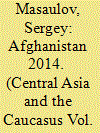

|
|
|
|
|
| Publication |
2013.
|
| Summary/Abstract |
The continuing destabilization of public life in Afghanistan and far from always successful attempts by the International Security Assistance Force (ISAF) to return it to normal are creating fundamental challenges and threats to regional and global security.
The following problems can be identified:
1. Higher drug production and circulation. This is causing a steady rise in both the number of people dependent on heroin and opiates coming from Afghanistan and the total number of drug addicts (according to experts, 36,000 young people die from drugs in Russia every year).
2. Stronger transnational crime groups in Central Asia (CA). Their activity is closely related to the drug business and movement of drugs from Afghanistan to Russia and Europe through the Central Asian countries.
3. Continued presence of armed U.S. and NATO forces in Afghanistan and its neighboring states in the form of their network of super bases is not helping to combat the threat of terrorism.
In recent years, it has become obvious that the CA states are facing a complex problem manifested in a dramatic deterioration of the internal situation in Afghanistan and Pakistan; an increase in the fragmentary Talibanization factor; similar situations in the border areas of Afghanistan and Pakistan; and an aggravation of the Pashtun issue.
The problem is that some of the former ideas about what is going on in Afghanistan do not correspond to current reality. It is incorrect to take the simplified approach and reduce the entire problem to the existence of the Taliban movement, under which all those drawn into the struggle against the ISAF in the wake of various ideas and slogans are lumped. Several Taliban centers function in Afghanistan and Pakistan (radical, extremist, and moderate).
The policy of the CA states should not be limited to endowing the large nations with the right to resolve the Afghan-Pakistani problems. States with interests in the country that are capable of having an impact on the development of the situation must also be engaged to untie the "Afghan knot"; the matter primarily concerns Russia, China, Iran, and the CA countries.
|
|
|
|
|
|
|
|
|
|
|
|
|
|
|
|
| 6 |
ID:
128387
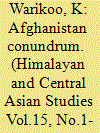

|
|
|
|
|
| Publication |
2011.
|
| Summary/Abstract |
Located at the crossroads of Central, South and West Asia and sharing. its borders with Central Asian Republics of Tajikistan, Uzbekistan and Turkmenistan on the north, Chinese province of Xinjiang in the east, [ran on the west and south west, and Pakistan and Pak-occu pied Kashmir on the south and south east, Afghanistan occupies a unique geo-strategic placement in the region. Distinct ethno-linguistic groups settled in different parts of .»'\fghanistan have diverse social moorings and political affiliations and aspirations. Th us the 'I'ajil
|
|
|
|
|
|
|
|
|
|
|
|
|
|
|
|
| 7 |
ID:
068199
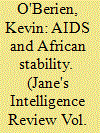

|
|
|
| 8 |
ID:
146295
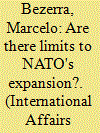

|
|
|
|
|
| Summary/Abstract |
THE EPICENTER of the earthquake that shatters Ukraine is located far beyond its dilemma of economic integration with the European Union or the Eurasian Union headed by Russia. The international dimension of this crisis (about which much has been already said in the post-Soviet epoch) concerns the defense and security issues or, to be more exact, the North Atlantic Treaty Organization's expansion to the east of Europe so that to tip the balance of power with Russia. This time NATO's persistent efforts at the borders of Russia produced two important events - an armed opposition in pro-Russian Donbass and reunification of Crimea with Russia, an event of historic consequence. This means that the project NATO is realizing in Ukraine as part of its security doctrine destabilized European security.
|
|
|
|
|
|
|
|
|
|
|
|
|
|
|
|
| 9 |
ID:
082870
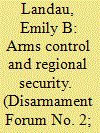

|
|
|
| 10 |
ID:
058851
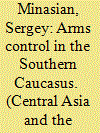

|
|
|
| 11 |
ID:
125567
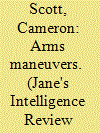

|
|
|
|
|
| Publication |
2013.
|
| Summary/Abstract |
The overthrow of Libyan leader Muammar Ghadaffi in 2011 prompted a flood of weapons into north Africa and the Middle East. Cameron Scott investigates the rise of illicit arms trafficking and its effects on regional stability.
|
|
|
|
|
|
|
|
|
|
|
|
|
|
|
|
| 12 |
ID:
086915
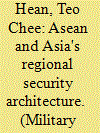

|
|
|
|
|
| Publication |
2009.
|
| Summary/Abstract |
Asia is changing, and changing rapidly. The growing economic influence and strategic importance of Notheast Asia and the Indian Sub-continent are apparent.Southeast Asia, positioned at the crossroads of India, Japan and China, is an integral part of this tapestry.
|
|
|
|
|
|
|
|
|
|
|
|
|
|
|
|
| 13 |
ID:
015563
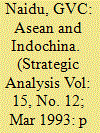

|
|
|
| 14 |
ID:
132400
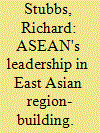

|
|
|
|
|
| Publication |
2014.
|
| Summary/Abstract |
Despite none of its members being a major economic or military power, the Association of Southeast Asian Nations (ASEAN) has played a leading role in building East Asia's regional institutions. In exploring this apparent puzzle, the analysis reviews the literature on state leadership at the regional and international level, asks why the region's major powers ceded leadership on the question of regional institution building to ASEAN, and assesses the consequences for East Asia's regional architecture of ASEAN's leadership role in institution-building. The conclusion is that leadership at the state level entails a state, or a group of states, proposing, executing and getting others to agree on a course of action to deal with a specific problem or challenge. The analysis also underscores the point that, while ASEAN has been the leader in East Asian institution-building, the Association and its members should not automatically be expected to play a leadership role on all issues preoccupying the region.
|
|
|
|
|
|
|
|
|
|
|
|
|
|
|
|
| 15 |
ID:
000808
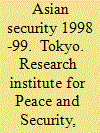

|
|
|
|
|
| Publication |
Tokyo, Research institute for Peace and Security, 1998.
|
| Description |
x,191p.
|
|
|
|
|
|
|
|
|
|
|
|
Copies: C:1/I:0,R:0,Q:0
Circulation
| Accession# | Call# | Current Location | Status | Policy | Location |
| 042191 | 327.116095/RIP 042191 | Main | Withdrawn | General | |
|
|
|
|
| 16 |
ID:
137356
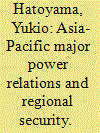

|
|
|
|
|
| Summary/Abstract |
I’m delighted once again that the 3rd World Peace Forum, under the leadership of President Tang Jiaxuan, is being held here at Tsinghua University. I would like to thank University president, Dr. Cheng Jining for granting me this opportunity to speak at this event for the third consecutive year. Last year, I was deeply honored to be awarded the title of Guest Professor. It is truly a great pleasure to return here to speak to you all once again, this time on the topic of Asia-Pacific Major Power Relations and Regional Security. When I was appointed Prime Minister of Japan in 2009 I published an essay in the magazine Voice. In the essay, I wrote the following passage: “As a result of the failure of the Iraq war and the financial crisis, the era of US globalism is coming to an end and … we are moving away from a unipolar world led by the US towards an era of multi-polarity.” I continued by writing “I believe that the East Asian region … must be recognized as Japan’s basic sphere of being.” In the five years since then, the political situation in Japan has changed considerably but my basic stance on this matter remains the same.
|
|
|
|
|
|
|
|
|
|
|
|
|
|
|
|
| 17 |
ID:
137357
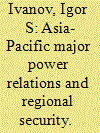

|
|
|
|
|
| Summary/Abstract |
Let me start my presentation with saying how privileged and honored I feel for having a chance to be here, at the Tsinghua University once again. Considering myself to be a veteran of the World Peace Forum, I have to say that over last years the Forum emerged as one of the most prestigious and representative meeting points for security related discussions in the Asia-Pacific region. In many ways, it is a unique opportunity for experts, educators, opinion makers and state officials of our large and diverse region to get together and to exchange views on critical issues of the past, present and future.
|
|
|
|
|
|
|
|
|
|
|
|
|
|
|
|
| 18 |
ID:
134019
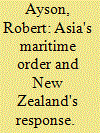

|
|
|
|
|
| Publication |
2014.
|
| Summary/Abstract |
Robert Ayson comments on the South China Sea. Asia's regional security and New Zealand foreign policy
as the powers jostle in a more competitive Asia-Pacific region, it may seem counter-intuitive to call for a clearer New Zealand position on the South China Sea disputes. But even as regional tensions grow, Wellington can stick up for its principles without joining a chorus of China criticism. Under the key government, New Zealand's alignment with the United States is becoming more pronounced through a series of small but cumulatively important steps. this makes it even more important for New Zealand's policy to be staked out clearly, including in written from accessible to the public discussion.
|
|
|
|
|
|
|
|
|
|
|
|
|
|
|
|
| 19 |
ID:
128999
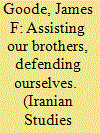

|
|
|
|
|
| Publication |
2014.
|
| Summary/Abstract |
The Iranian military intervention in Oman (1972-75) proved to be one of Shah Mohammad Reza Pahlavi's most successful foreign policy initiatives. He entered at the request of Sultan Qabus to help quell the Marxist rebellion of the Popular Front for the Liberation of Oman in Dhufar province. The shah took this action without any prior consultation with either Britain or the United States, acting for reasons wholly related to Iran's regional security. In so doing, he angered most of his Arab neighbors, who protested vigorously. He persisted. His troops tipped the balance in favor of the sultan's forces, contributing to a speedy end to the insurrection, for which Iran earned the lasting gratitude of the sultan.
|
|
|
|
|
|
|
|
|
|
|
|
|
|
|
|
| 20 |
ID:
171246
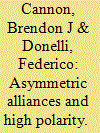

|
|
|
|
|
| Summary/Abstract |
The Middle East and the Horn of Africa exist in two distinct regional security complexes (RSCs), groupings of states exhibiting intense security interdependence within a distinct region, but rarely between regions. Recent geopolitical changes and related analyses, however, point to either a subsuming or a joining of the two RSCs, potentially leading to a high degree of uncertainty in two conflict-prone regions. Given the importance of such developments, we question this theory of RSC expansion by offering a concise review of recent security interactions between the two RSCs as well as quantitatively and qualitatively measuring the material power capabilities of relevant states. Borrowing from and contributing to RSC theory, we also identify and analyse concepts and indicators such as threat perception and sub-regional alliances. Our findings demonstrate the Middle East RSC is not expanding to include that of the Horn of Africa. The two remain distinct and under internal consolidation, despite the current discourse. Rather, high polarity in the Middle East coupled with often-congruent interests in Horn of Africa states best explains the current pattern of their interaction, particularly as Middle East states pursue strategies that further their own security interests at the expense of rival states within their own RSC.
|
|
|
|
|
|
|
|
|
|
|
|
|
|
|
|
|
|
|
|
|